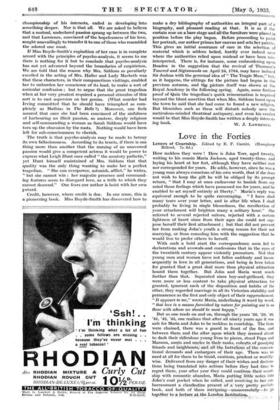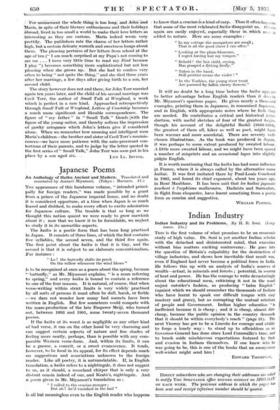Love in the Forties
Letters of Courtship.. Edited by E. F. Carritt. (Humphrey Milford. 7s. 6d.) • -
How reckless they were ! Here is John Torr, aged twenty, writing to his cousin Maria Jackson, aged twenty-three, and laying his heart at her feet, although they hgVe neither met nor corresponded for years. He adds, however, since he was a young man always conscious of his own worth, that if she does not wish to keep the •gift he will be obliged by its prompt return, " that I may at once endeavour to banish from my mind those feelings which have possessed me for years, and be enabled to set myself entirely at liberty." Maria's reply was equivocal enough to be quite encouraging. " I have shed many tears over your letter, and in after life. when I shall probably be living in single blessedness, the recollection of your attachment will brighten many a solitary hour." She referred to several rejected suitors, rejected with a certain lightness of heart since from their ages she could not sup- pose. herself their first attachment ; but that did not prevent her from making John's youth a strong reason for their not marrying, or from consoling him with the suggestion that he would live to prefer others to herself.
With such bold ,start the correspondence, soon .led to declarations and avowals-and confessions that in the eyes of the twentieth century appear violently premature. Not that young men and women have not fallen suddenly and incon- sequently in love in all generations, and being in love taken for granted that a great deal more than physical attraction bound them together. But John and Maria went much further than that. Separated since boy-and-girlhood, they were more or, less . content to take. :physical attraction for granted, ignorant each of the disposition and habits of the other, they regarded marriage in all its Victorian stability and permanence as the first and only object of their rapprochement. "It appears to me," wrote Maria, underlining it, word by word, " that love is a means furnished by nature for pointing out to us those with whom we should be most happy."
But as one reads on and on, through the years '38, '39, '40, '41, '42, '43, one realizes that after all ninety years ago it was safe for Maria and John to be reckless in courtship. The lions were chained, there was a guard in front of the fire, and between them.. and the altar ,upon which they seemed about to dash their ridiculoui young Hi,* to pieces, stood Papa and ' Mamma, aunts and uncles in their- ranks, cohorts, of gossiping friends and iteighboltis.; and alfthe ,battaliOtis, of .;the conven- tional demands and embargoes of their age. There was no need at all for them to be timid, cautious, prildent or worldly- wise. Delivered from any danger of their wishes and declara- tions being translated into _actions before they had . time to regret them, year after year they could continue their court- ship with romantic abandon, Maria putting little notes into John's coat pocket when he called, and receiving to her em- barrassment a clantlestine. present. ofn" Very Pretty pocket- book, and both of them intriguing—unsuccessfully—to go together to-a lecture.at.the 1,,andon Institution. -„... I For -arniiienient the whole-thing is too long; 'and John and- 'Maria, in spite of their literary enthusiasms and their holidays ibroad, lived in too small a world to make their love letters as interesting as they are curious. Maria indeed wrote very prettily. The publishers rate the charm of her letters rather high, but a certain delicate warmth and sweetness hangs about them. The pleasing' ertness of her letter§ from school at the age of ten (" I am much surprised at my Papa's not coming to see me . . . I have very little time to read my Iliad because I play ") becomes something more sophisticated but not less pleasing when she -grows up.- But she had to confess very often to being " not quite the thing," and she died three years after her marriage, a few days after giving birth to a son, her second child.
The story however does not end there, for John Torr married again ten years later, and the child of his second marriage was Cecil Torr, the author of Small Talk at Wreyland, a work which is perfect in a rare kind. Approached retrospectively through Small Talk at iVreyland, Letters of Courtship becomes a much more significant and likeable correspondence. The figure of " my father " in " Small Talk " blends [with the figure of the young suitor, and thereby softens the impression of gawky arrogance which John's letters give if considered alone. When we remember how amusing and intelligent were Maria's children—the brother and sister of Cecil Torr's reminis- cences—we have more patience with the ante-procreant con- tortions of their parents, and to judge by the letter quoted in the first series of " Small Talk," John Torr was soon put in.his











































 Previous page
Previous page